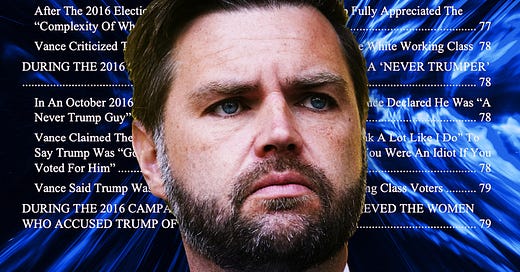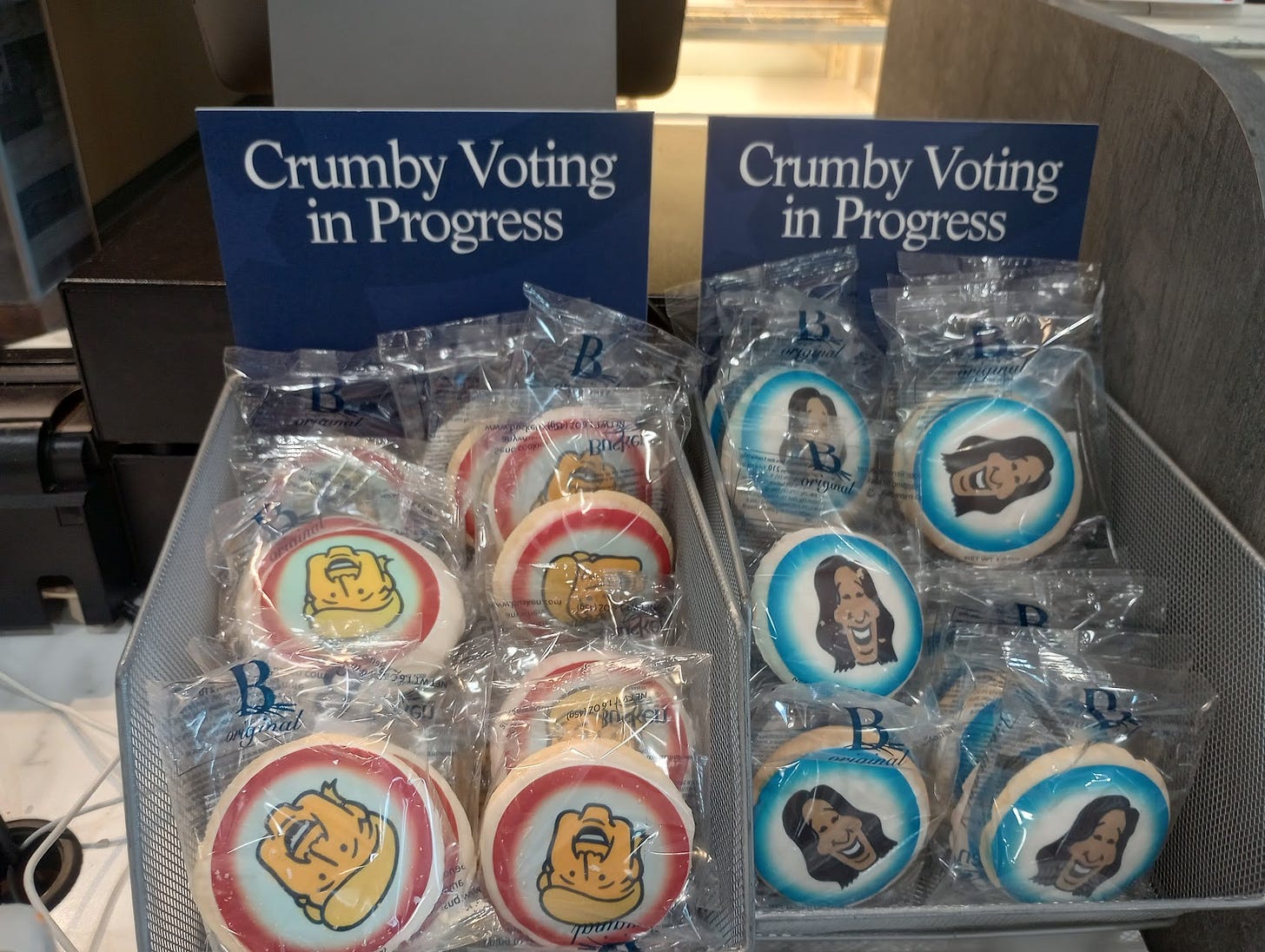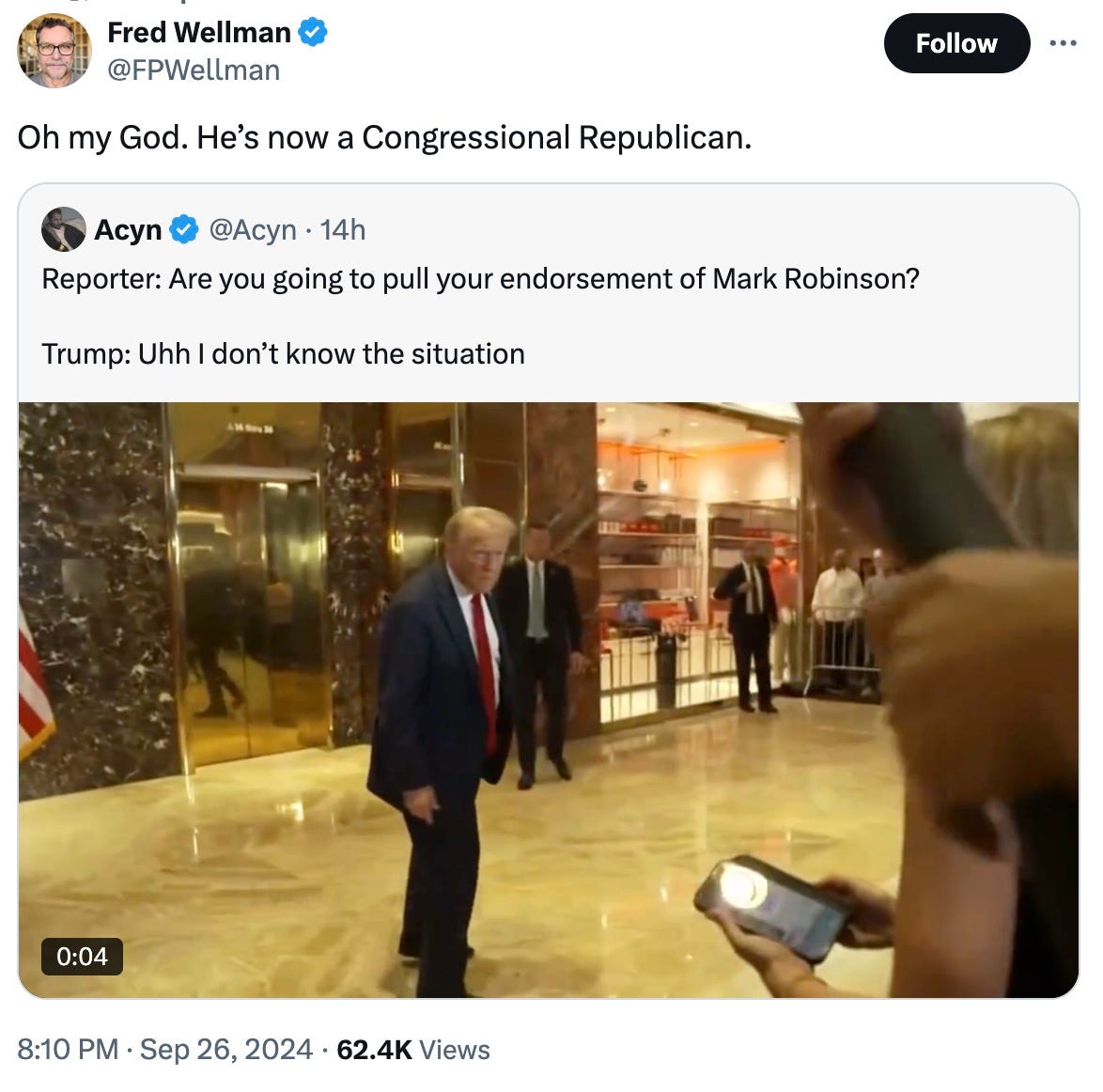
What Vance’s Vetters Missed
The most notable thing about the leaked dossier is what was left out of it.
Devastating scenes out of Florida last night after Hurricane Helene slammed into the state’s Big Bend, leaving at least six people dead and knocking out power for millions of others across the Southeast. Say a prayer for those in the impact zone today. Happy Friday.
Cat’s Out of the Bag
—Marc A. Caputo
The opposition-research dossier put together by the Trump campaign on JD Vance—and allegedly stolen from them by foreign hackers—was published on Thursday by journalist Ken Klippenstein on his Substack.
And what stands out is not what’s in the 271-page file, but what was left out.
Vance’s infamous “childless cat ladies” comment was not listed among the liabilities that the Trump campaign assessed about the then-prospective running mate.
That comment from Vance—which was made, among other places, during a 2021 Fox interview with Tucker Carlson—ended up dogging both him and the Trump campaign in the weeks after he was selected, helping Kamala Harris’s campaign drag down his favorability ratings and define him negatively. Taylor Swift, among others, referenced the “childless cat lady” dig when announcing her support for Harris.
As to why the Trump campaign’s researchers didn’t include that the cat lady remarks, aides aren’t saying. The campaign has inveighed against news outlets publishing material that was allegedly obtained by a foreign adversary while declining to confirm the validity of the content. Two other people who independently obtained the Vance dossier, however, both told The Bulwark that the cat lady comments were not in it.
The exclusion suggests that Trump campaign researchers either missed Vance’s incendiary remarks or thought they were no big deal. The former, however, seems implausible as the document posted by Klippenstein included dozens of other citations of Vance’s appearances on Carlson’s show.
Indeed, much of the oppo file, Klippenstein notes, consists of a copious scrubbing of the public record that is “factual and intelligently written.” It’s typical opposition research assembled with open-source information available online and in the news media concerning Vance’s prior criticisms of Trump, his “obstructionist” stance on Ukraine funding, his support of abortion restrictions, opposition to marijuana legalization, support of “pseudo Christian values,” and comments on race.
Vance comes across as a right-leaning classical liberal who became a Trump era conservative populist. There was nothing obviously disqualifying in it, which explains, in part, how he got selected for the post.
Since the Trump campaign is not commenting on the document, it must be considered with a few caveats. The Bulwark has not verified the entire document. The hackers may have intentionally included disinformation in the version posted by Klippenstein. The hackers have their own agenda in both obtaining and disseminating the document. The document published by Klippenstein also may not be the final version; it’s possible that a subsequently produced file did include the cat lady comment.
But it’s also unclear why the mainstream media outlets that were first given the document two months ago didn’t report on its omission of the cat lady comment—or on the dossier in general. The disparity in treatment between this dossier and the hacked Democratic materials in 2016 is striking, as I noted last month. When a story doesn’t get covered, it needlessly looks like a coverup.
Becoming Vocabulary
—Andrew Egger
The indictment against New York City Mayor Eric Adams is out: Adams, prosecutors allege, traded favors and took bribes from foreign nationals, then directed aides to try to cover his tracks.
Most notably, Adams allegedly pressured the New York Fire Department to waive a fire inspection on an unsafe Turkish consular building because Turkish officials wanted to have it open in time for a visit from their president, Recep Tayyip Erdoğan.
In yesterday’s Politico Playbook, the newsletter’s authors described Adams’s response to the indictment as “Trumpian”: Adams had vowed to “not step down from his post” and “fight the expected charges from the feds, decrying them as ‘entirely false, based on lies.’”
This use of Trumpian stood out to me. When we call things Trumpian today, it’s just another way of saying “like Trump.”But it raises the question: If Trumpian eventually makes it into the semipermanent English lexicon—if Trumpian, in other words, outlives Trump—what will people actually mean by it?
Plenty of people, both real and fictional, end up as common words: Freudian, quixotic, Kafkaesque, Clintonian. But these words no longer just describe the people they call back to; they capture some essential characteristic associated with them.
Maybe—hopefully not!—we’ll be coming out of a second Donald Trump term four years from now in which Trumpian took on an even darker connotation.
But I wouldn’t be surprised if the sense in which Playbook used Trumpian is the one that sticks—a shorthand for a scandal-management strategy that trades persuasion for a posture of maximum defiance and gaslighting. After all, Trump has changed the course of his own party in a hundred wretched ways, but the biggest bipartisan damage he’s done is to provide a model for neutering controversies simply by brazening them out.
Prior to Trump, a common model for dealing with controversy was the approach Bill Clinton perfected. If damaging news was coming to light, the first move was to parry it, usually through a combination of clever, hairsplitting lawyerspeak and personal charm. If that became untenable, there was the backup strategy: A doe-eyed, heartfelt apology, accompanied by a pledge to learn and grow.
The goal of this strategy is to “win” the scandal in the eyes of the public. But it’s also difficult to pull off successfully. The Trumpian anti-scandal model, by contrast, is simple enough for anyone to take a crack at. It doesn’t try to win the controversy, it rejects its existence. That a controversy even appears to be happening is always the work of shadowy malign actors trying to drag the Trumpian down.
As this model is not very persuasive to anyone not already in the Trumpian’s corner, it isn’t as effective at winning a given scandal as the Clinton model. But the genius of it is in the insight that winning the controversy doesn’t matter. Outlasting it does. All it takes is a complete absence of shame.
Indeed, a controversy only becomes career-defining for a politician if it successfully ends that politician’s career. And for most politicians, it will only end your career if it kills the support of your own base. The scandal can be real and serious, but if you refuse to resign and nobody else is in a position to make you resign, you can just keep chugging ahead. Sooner or later, the public will move on too.
Five years from now, we’ll consider ourselves lucky if Trump’s worst contribution to bipartisan political strategy was paving the way for a generation of untalented boobs to deflect accountability from the scandals they cause. But that contribution’s been plenty awful in and of itself. Go ahead—put him in the dictionary.
My Crumby Vote
—Jim Swift
As the newly minted (read: self appointed) Cincinnati bureau chief of The Bulwark, my interest was piqued when the well-known Busken Bakery Cookie Poll made a splash on social media yesterday.
The Buskens have been baking treats in Cincinnati’s Hyde Park neighborhood since 1928. And they’ve been making predictions about who will win the White House based on sales of cookies designed to look like the prospective candidates. This year, Trump has emerged as the leader. It was my journalistic duty to not just report it out, but, um, sample the ballot.
The store plays up their quirky political ties. “We like to joke and say [customers] can stuff the ballot box,” Dan Busken, the CEO of the bakery, told the New York Post. The parking spots are decorated with signs depicting Harris, Trump, and the bakery’s locally beloved iced smiley face cookies, but with a patriotic flair. Inside the bakery, jokes abound: With Trump you can “Make Your Milk Great Again” and with Harris, you can “Share the Dough.” The Trump cookies are “Rich and Flaky” and Harris’s are “Liberally Iced”, though the cookies are exactly the same, and delicious, except for their design, done by a local caricature artist.
You can only get the candidate cookies from one of the four Busken locations around town (including one in Kentucky). They can also be purchased online. All purchases, no matter how frequent, and with no limit, count towards the total. Ohio residency is not required.
By the time I stopped in on Thursday morning, Harris was trailing Trump for the day, 9,827 to 3,131. Considering Ohio’s increasingly Republican political leanings, Trump is likely to prevail.
The Busken President Cookie Poll has been accurate in every election except for 2020, when Trump won the cookie count but Joe Biden won the electoral college.
And, frankly, maybe we shouldn’t have been surprised. The mantra of “As Ohio goes, so goes the nation” has lost a bit of its luster. Since 1904, Ohio has gotten it wrong three times: Thomas Dewey (whose running mate was Ohio Governor John Bricker) in 1944, Nixon in 1960, and Trump in 2020. So should Harris defeat Trump in November, don’t blame Busken’s. And if you feel strongly about preserving the sanctity of the cookie poll, you can (and should) order some for yourself.
Quick Hits: Trump Turns on Zelensky
An important piece from Will Saletan up at the site today:
Ukraine’s relations with the United States have taken a dangerous turn: Donald Trump has begun to think of Ukraine’s president, Volodymyr Zelensky, as his political enemy.
Trump has always sympathized with Russia and was never a fan of Ukraine. But until recently, Trump’s statements about the war in Ukraine were tempered by a personal factor: Trump liked Zelensky for defending him in 2019, when Trump faced impeachment for pressuring Ukraine to smear Joe Biden.
This week, that bond broke. Zelensky went to Pennsylvania, accompanied by Democratic politicians, to thank American workers for manufacturing ammunition that is saving Ukraine. Meanwhile, the New Yorker published an interview in which Zelensky disputed Trump’s boasts about knowing how to end the war.
In response to these developments, Trump has publicly turned against Zelensky, prompting a scramble by Zelensky to meet with Trump and get back in his good graces. Zelensky understands that Trump’s personal animus, combined with Trump’s isolationism, puts Ukraine in grave danger.





















Re: Adams Indictment. Half of what's detailed in the indictment is no different from what Clarence Thomas has been up to. Where's his indictment?
Marc hit the nail on the head. Recently comments were published from the editors of both the NYT & the Post. Both said they found the “dossier” to not be newsworthy despite this omission. But apparently neither outlet had trouble finding the newsiness in John Podesta’s risotto recipe. These people make me sick.